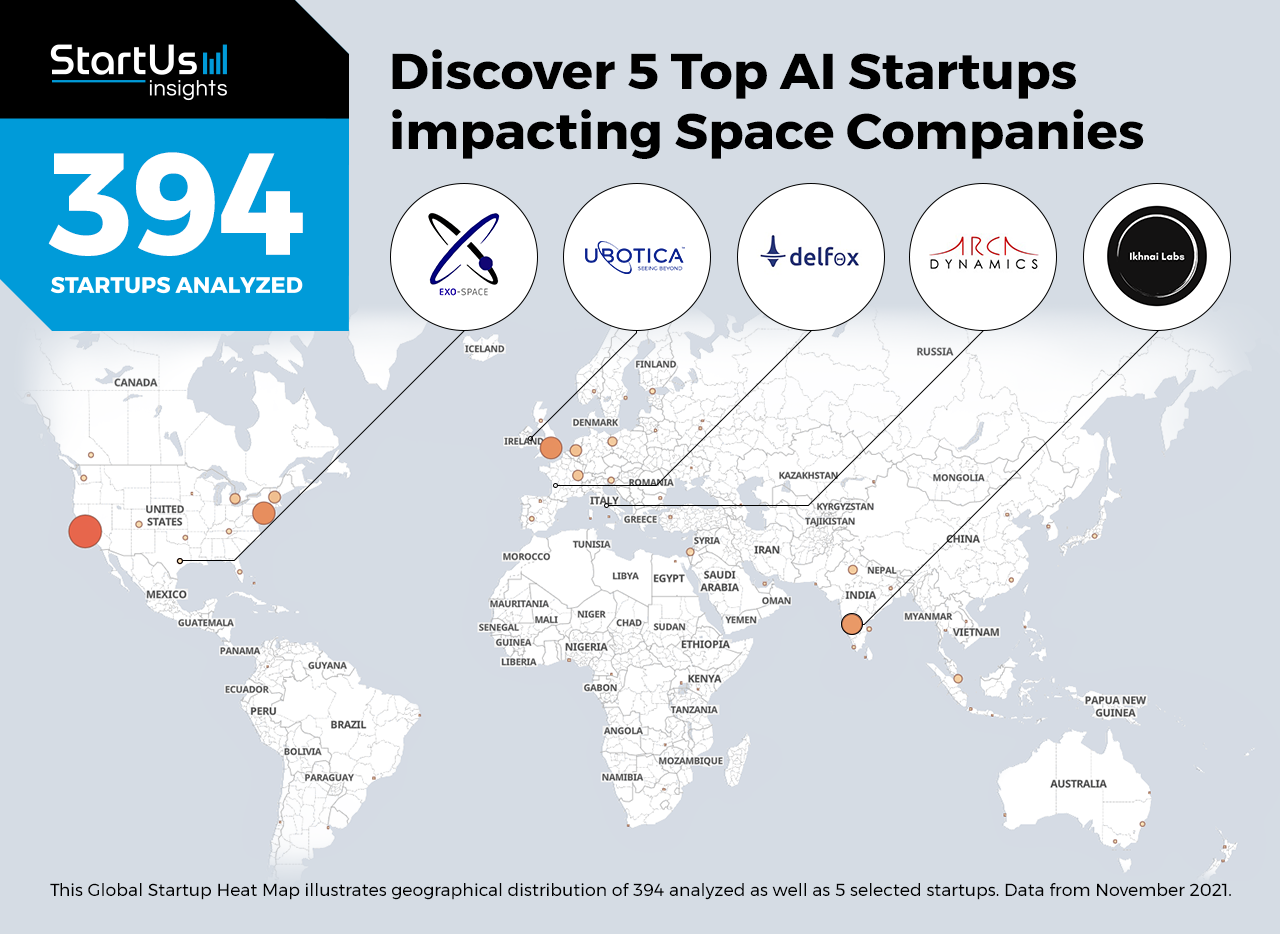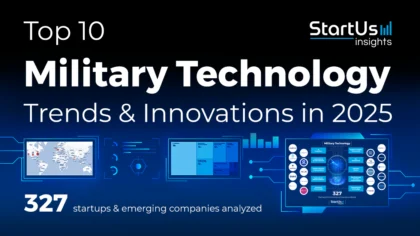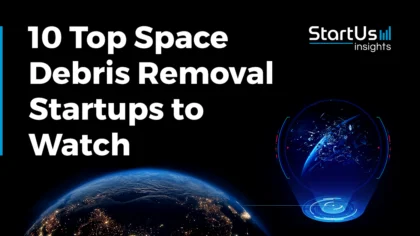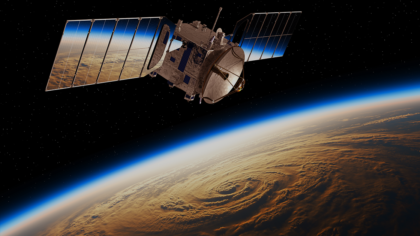Staying ahead of the technology curve means strengthening your competitive advantage. That is why we give you data-driven innovation insights into the SpaceTech industry. This time, you get to discover 5 hand-picked artificial intelligence (AI) startups impacting space companies.
Out of 394, the Global Startup Heat Map highlights 5 Top AI Startups impacting Space Companies
The insights of this data-driven analysis are derived from the Big Data & Artificial Intelligence (AI)-powered StartUs Insights Discovery Platform, covering 2 093 000+ startups & scaleups globally. The platform gives you an exhaustive overview of emerging technologies & relevant startups within a specific field in just a few clicks.
The Global Startup Heat Map below reveals the distribution of the 394 exemplary startups & scaleups we analyzed for this research. Further, it highlights 5 SpaceTech startups that we hand-picked based on criteria such as founding year, location, funding raised, and more. You get to explore the solutions of these 5 startups & scaleups in this report. For insights on the other 389 AI solutions impacting space companies, get in touch.
Ubotica Technologies offers Satellite Data Services
Founding Year: 2016
Location: Dublin, Ireland
Partner for Geospatial Data Analytics
Irish startup Ubotica Technologies provides satellite data services. Its AI-powered platform, Cognisat, uses computer vision and machine learning (ML) algorithms to impart high-performance processing capabilities in low power architecture. It enables efficient bandwidth usage and provides flexibility to run multiple parallel applications on satellite data ranging from earth observation (EO) and debris tracking to telemetry. The startup enables low-latency, high frame rate data processing for payload operators.
Exo-Space enables In-Orbit Edge Computing
Founding Year: 2019
Location: Pasadena, US
Collaborate for Earth Observation (EO) Data
US startup Exo-Space provides in-orbit edge computing solutions. The start-up’s product, FeatherEdge, is an AI-powered payload for image processing deployed in satellites. It features integrated software for image classification and object detection. It detects clouds and other obstacles and autonomously analyzes satellite images. The startup’s solutions enable radiation-safe, faster image data processing on edge, reducing revenue loss due to high latency.
ARCA Dynamics offers Space Traffic Management
Founding Year: 2016
Location: Rome, Italy
Work with ARCA Dynamics on SmallSats
ARCA Dynamics, an Italian startup, operates nanosatellites for smarter STM. The startup’s smallsats utilize AI for guidance, navigation, and control (GNC), altitude determination, and in-orbit demonstrations (IOD). It employs sensors, actuators, computer vision technology, and space robotics to provide satellite operators with satellite autonomy. The startup advances sustainable space traffic management such as active debris removal (ADR), collision avoidance, rendezvous, and docking.
Craft Prospect enables Low Latency Space Operations
Founding Year: 2017
Location: Glasgow, UK
Reach out for Responsive Space Operations
British startup Craft Prospect supports space mission owners by providing custom applications and mission architecture. The startup utilizes AI with low-power embedded systems to auto-optimize resource usage in smallsats and provides responsive operations. As a result, the satellite operators do not need to wait for the next ground station pass to respond to an event of interest. The startup’s products enable ground-based processing power for onboard systems while ensuring cybersecurity with quantum encryption.
Ikhnai Labs makes Space Tugs
Founding Year: 2018
Location: Hyderabad, India
Partner to enable Space Debris Removal
Indian startup Ikhnai Labs provides solutions for space situational awareness (SSA) and active debris removal (ADR). The startup uses deep learning technologies to map and track space debris in low earth orbit (LEO). It provides in-orbit servicing and end-of-life operations for spacecraft by equipping them with AI-enabled systems onboard and on the ground. This improves the safety and sustainability of LEO space missions.
Discover more SpaceTech Startups
SpaceTech startups such as the examples highlighted in this report focus on earth observation data, geospatial analytics, and space data. While all of these technologies play a major role in advancing the space industry, they only represent the tip of the iceberg. To explore more space technologies, simply get in touch to let us look into your areas of interest. For a more general overview, you can download our free SpaceTech Innovation Report to save your time and improve strategic decision-making.



![15 Top Defense Companies and Startups to Watch in Europe [2025]](https://www.startus-insights.com/wp-content/uploads/2025/03/Defense-Companies-in-Europe-SharedImg-StartUs-Insights-noresize-420x236.webp)





